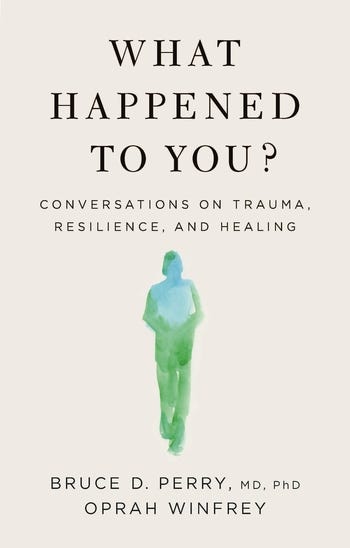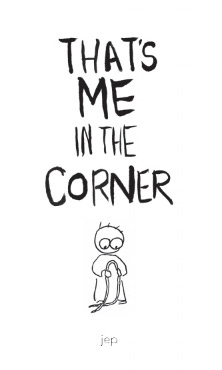A few recent discoveries have been seriously shocking to me - the first one being that I truly love and appreciate and needed a book … by … Oprah Winfrey.
OPRAH?
I suppose I don’t have any strong opinion about Oprah - I just know I’m supposed to signal that I don’t read O (is that still a magazine?), to explain my initial reticence. When she arrived on the scene in the 80s I dug her in The Color Purple; I haven’t re-seen it since, but I recall it was powerful. I was not impressed by talk shows in general, having been long-bred to look down on TV. But I had nothing against her in particular. Over time she became a phenomenon, a brand, and I sort of reflexively dismissed her (because I had trained my own self to look down on things “mainstream” - a sliding scale if there ever was one).
This book - written with a doctor who works in her school for girls - has a really simple framing device: Instead of asking what is wrong with someone, they suggest you ask rather what HAPPENED to them. Because most people can be explained and illuminated by figuring out what went wrong in their development: Putin, Trump, John Lennon, you, me. And it’s brilliant. It gave me a lot of information I needed.
Trauma
I'd been thinking about trauma for a few years. I’d been hearing Gabor Mate on podcasts (Russell Brand’s specifically, more than once) and found myself agreeing with his every single word, and thinking about it a lot during these last challenging five years. A lot was revealed about the world during Trump’s disgusting era. SOOO much was revealed about my family following the death of my mother. And then COVID shone a blinding light on every fault in our society. Trauma was involved in every little bit, and explained so much. I was primed. BUT.
Why Do You Write These Comics?
I was also trained early on to ignore and forget traumas. I knew most of my story, but thought that having a fragmented sense of self was normal. Getting the pieces back together only started with writing comics. I started applying myself somewhat seriously to making comics when I was 34; when I was about 40 I could see that my comics lacked any consistent style, and my linework and lettering was seriously amateurish, and so I decided I needed a long-term and regular project, for sustained practice.
I thought I was quite familiar with the story of my family’s descent into religiosity, and that that would allow me to “just write” a weekly strip about it. The project was called That’s Me in the Corner, and it surprised me on the regular - especially when I had to finally, finally admit that my loss of religious faith was not purely intellectual, that it was informed by the betrayal by these monstrous priests. I was shocked. But it was useful knowledge.
I struggled long and hard with the process of uncovering, but was fascinated by how writing the story of my life helped me feel more and more like a Real Person with each iteration. I had to admit to myself that I really didn’t want to write or make comics about much else. I only really know one story, and it has been healing and solidifying for me to write about myself - as a child, during Trump, under Global Warming, and in my fantastic marriage. AND, I developed a style. My lettering is getting there.
Trauma-Informed Teaching
I took this trauma idea into my classrooms - or, rather, I mindfully made sure to include it. I began to make the connection between students who could not or would not engage with schoolwork because of their own life situations, and helping them by prioritizing their soul-needs first, and this became easier and easier - because it was effective and helpful, to them and to me. I put Lynda Barry’s One! Hundred! Demons! into a course, and A Mind Spread Out on the Ground (Alicia Eliott’s incredible and illuminating memoir), and (as mentioned last episode) started explicitly telling my students that storytelling (and the loving reception of it) was a trauma-healer.
And then this summer - 2021 - I saw Oprah’s book What Happened To You? and it grabbed my interest. I avoided it for a bit, until a friend mentioned having enjoyed it (thanks Matt) and then I got and gobbled it down. It’s so radically common-sensible: unaddressed traumas create dysfunctional habits of self-protection. Airing them out and analyzing them really, truly helps. I was really surprised to learn about dysregulation, and that my endless drumming and finger tapping are a legit phenomenon among the adult versions of traumatized children - it’s a calming thing, like when you rock a baby, and it’s almost always rhythmic.
Addiction!
I looked around for more books like this, saw Gabor Mate’s In the Realm of Hungry Ghosts, and thought, “Dang. I want to read it, but what do I care about addiction? I’m solid.” Self-delusion is POWERFUL.
I’m an ex-cigarette-smoker (for 20 years) who cannot sit still. I’m a kind person who bursts into unholy rage under certain situations, carries a big chip on his shoulder, and can barely contain himself when any person tries to dominate him. On many private occasions I have abused food and beer. And (this is a first public admission) I have been an extremely regular cannabis user for over half my life. (I am not ashamed of it - I love smoking marijuana and posing next to that pretty “cool” addiction. The reason I didn’t include it in any comics overtly was the same reason I never smoked a cigarette at school. I didn’t want to be a bad example to the kids who look up to me.)
Me??
SO ANYWAY: in a week, my wife and I are embarking on a journey to the USA, and we’ll be crossing a Drug-War border that feeds addicts to its for-profit Prison Industrial Complex. I absolutely had to stop smoking weed. Up until just this point, I would have told you that I smoked so much just because it “suited me.” No addictions involved!
Then the penny finally dropped. Somehow, now, I was able - because of the situation, because of this book, because I’d gotten access to these memories - to see that my cannabis habit was formed after a six-month-long bout of brutal insomnia at 25; that my insomnia was related to having been woken up by a trusted and god-dammed molester of a priest; and that weed allowed me to both sleep AND avoid the pain of that trauma. When I told my partner that I’d finally clued in that I was as much an addict as any other, we laughed. Of course! Self-delusion is a powerful drug itself.
Me.
So I embarked on the Gabor Mate book, in which he makes it clear that MOST addicts carry traumas; that addictions treat the symptoms of trauma, regardless of the “hard”ness of the substance; that he himself has this trait, even if it is only about collecting music. And the scales fell from my eyes. I laughed and laughed with the delight of revelation. How did I not see that? (Answer: we see what we can handle.)
And I quit smoking weed. Strike that - I AM quitting weed, currently. I’m suffering withdrawal and dysregulation and insomnia, and all the shit is coming back up, but I’m really glad, and really grateful, to have begun to sort it out. I intend to keep the abstinence going, and hope someday to smoke a nice singular joint because I actually want to, and then not follow it up with MORE.
I strongly recommend Oprah’s book if you have an inkling that there might be something wrong with you that you could fix. And Gabor Mate is brilliant, and I recommend either this book or Scattered Minds, which is about adult ADHD.
More than anything, though, I recommend sticking an Oprah idea into your back pocket: Instead of wondering “What the fuck is wrong with you?”, maybe ask “What happened to you?” It’ll take you farther.
An Old Song
Here’s an old song I wrote about my addiction to weed and my continual failure to quit. I wrote/recorded it about 15 years ago, and never shared it much because it felt like an extremely lame thing to admit being addicted to. It’s too long, and some of the lyrics suck, but I can hear in my own, old voice the wish to figure it out. And now I have. Now I am.
PS Late Breaking Addendum:
I listen to Ezra Klein every week - for years now. He’s got a fantastic and fascinating discussion out just today that is super relevant (and which is extending my understanding - I will absolutely be reading his guest Dr. Van Der Kolk’s book “The Body Keeps the Score”).
Thanks for reading. Peace out.
jep







